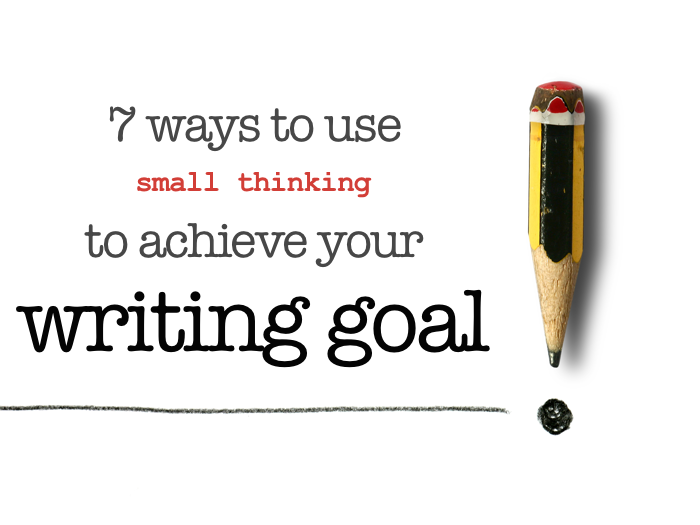7 ways to use small thinking to achieve your writing goal
 Feeling overwhelmed by your writing goal? Chris Smith of Prolifiko says you can achieve big things by thinking small.
Feeling overwhelmed by your writing goal? Chris Smith of Prolifiko says you can achieve big things by thinking small.
[rt_reading_time label="Reading Time:" postfix="minutes" postfix_singular="minute"]
Writing advice can be pretty unhelpful sometimes can’t it? Well-meaning friends, colleagues, social media buddies and perhaps even tutors telling you to go for it or just get writing. After all, what’s stopping you?
And of course they’re right. There’s only one thing that really gets in the way of you writing – and that’s you and your psychology. But that doesn’t make the writing process any easier.
To date, we’ve had around 3,000 writers use our prototype online writing coach – a system that uses a small steps methodology to help you tackle your big writing goal.
While taking large leaps might feel like progress, ultimately they lead to burn out and failure. Pragmatically and practically, taking small, regular, incremental steps towards meeting your goal is far more effective approach to help you finish your writing project – and the science agrees.
Why small steps help you smash your writing goal
Dr Robert Maurer is a clinical psychologist working at the UCLA School of Medicine. He was one of the first scientists in the world to research how taking small steps can help us achieve our goals in all walks of life.
In general, he found that people who take on too much and decide to max-out and strain every sinew to achieve their goals were far less likely to achieve them (or even start) than people who took it slow, steady and generally tortoise-like.
He found that tackling a large goal in an all-or-nothing kind of way triggers your ancient ‘flight or fright’ mechanism. It sends your Amygdala – the bit of the brain that controls your emotions – fleeing from the goal in the same way you might run from any threat.
“Small, easily achievable goals let you tiptoe right past the amygdala, keeping it asleep and unable to set off alarm bells.” – Robert Maurer, One Small Step Can Change Your Life
So, instead, Maurer recommends creeping past your brain’s ancient wiring and fooling it into thinking that you’re not really taking on a large goal at all. In short, think small.
With that in mind, here are our seven tips to incorporate a ‘small thinking’ methodology into your writing process. It’s the system we’ve used to successfully help hundreds of people to start writing. It can help you too.
1. Start microscopic – then build up
When starting off, make your first steps towards meeting your writing goal embarrassingly small – so small that you can’t fail. How about writing for one minute a day or sitting at your desk for five minutes? At this stage, the point isn’t to make lots of progress, it’s to adjust your mindset and attitude – and build your confidence so you start taking on more each day. The moment it feels easy – then add another minute, and then another.
2. Make it a super-quick win
When you’re setting your step, it’s important to feel it’s achievable quickly. Where you might not feel 100% confident you can meet your overall writing goal (and that’s a good thing because it keeps you stretched and motivated) you need to be pretty sure that you can achieve a step in the time you’ve given yourself. So, don’t make your step too difficult, make it simple, realistic and achievable given the time you have.
3. Make it specific
Steps work the best when you know you’ve achieved them – and that means they need to be quantifiable in some way. ‘Write more today’ isn’t something you can measure. ‘Write 100 words more than yesterday’ or ‘write for 30 mins before breakfast’ is specific and can be ticked off your list once you’ve achieved it. This is important because the act of ‘ticking off’ a step will keep you motivated to move forward towards your goal.
4. Put on your writing blinkers
When you’re taking a small steps approach you should be thinking one step in front of the other – so put your writing blinkers on! Try not think about your progress towards your project as a whole, just think about the next immediate thing you can do to move your project forward. The key is to creep up on your big goal so slowly that you don’t even notice that you’re doing it.
5. Do ask yourself tiny questions
One of the most powerful ways to programme your brain into a small steps way of thinking is to ask regular, small and crucially – constructive questions to move your project forward. What small thing can I do next to move my project forward? What one thing can I achieve in my writing session tomorrow? Focus down on actions and only consider the next thing you can do to move forwards towards your goal – one step at a time.
6. Don’t ask yourself big questions
Try to put those big soul searching questions in a box labelled ‘do not touch’. Considering the kind of questions that keep you tossing and turning at night: Why can’t I do this? What if I fail? Why does nobody love me? Can be demotivating and damaging and don’t help you reach your goal. Unspecific, large and mostly negative questions like these only ever lead to non-constructive soul searching, guilt and creative paralysis.
7. Check back – and reflect
When you start writing, you certainly don’t need to have every step nailed down, but it’s a good idea to check back and see if your steps are heading in the right direction. Don’t worry if your steps are taking you off on a tangent (it’s sometimes good to go with the flow) but understand why they’re taking you there and what you can learn the next time you set a goal.




My contribution, use small thinking? Spider diagrams/mind map tools massively help when planning out your writing this way.